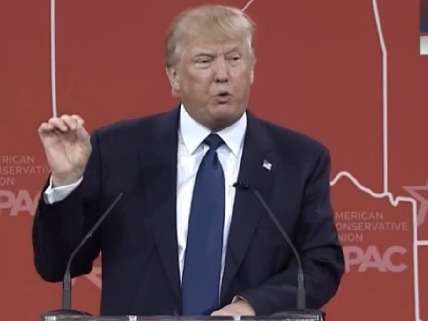When He Called for an End to the War on Drugs, Trump Claims, He Meant It Should Be Waged More Aggressively
The Republican presidential contender is keen to pretend he never said drugs should be legalized.

When asked about marijuana legalization at the Conservative Political Action Conference last February, Donald Trump said, "I think it's bad, and I feel strongly about that." During a 1990 speech in Miami, by contrast, Trump spoke in favor of legalizing not just marijuana but all prohibited intoxicants. Here is The Miami Herald's account of his remarks:
[Trump] said that legalizing drugs is the only way to win the war against what he considers to be one of America's most serious problems.
Trump blamed the country's drug problems on politicians who "don't have any guts" and enforcement efforts that are "a joke."
"We're losing badly the war on drugs," Trump said. "You have to legalize drugs to win that war. You have to take the profit away from these drug czars."
Trump said tax revenues from a legalized drug trade could be spent to educate the public on the dangers of drug use.
In an interview, Trump said he felt it was an appropriate time to broach his ideas "because South Florida has such a huge problem with drugs."
"What I'd like to do maybe by bringing it up is cause enough controversy that you get into a dialogue on the issue of drugs so people will start to realize that this is the only answer; there is no other answer," Trump said.
On ABC's This Week yesterday, George Stephanopoulos asked Trump why he changed his mind on this issue, and Trump implied that he hadn't:
Stephanopoulos: You used to think that legalization, taking the profit out, would solve that problem. What changed your mind?
Trump: Well, I did and I—I —not think about it, I said it's something that should be studied and maybe should continue to be studied. But it's not something I'd be willing to do right now. I think it's something that I've always said maybe it has to be looked at because we do such a poor job of policing. We don't want to build walls. We don't want to do anything. And if you're not going to want to do the policing, you're going to have to start thinking about other alternatives. But it's not something that I would want to do. But it's something that certainly has been looked at and I looked at it. If we police properly, we shouldn't do that.
In 1990 Trump did not merely say drug legalization "should be studied"; he said it is "the only answer," and "there is no other answer." And while he did call the government's efforts to enforce prohibition "a joke," he did not argue that the war on drugs could be won by trying harder. To the contrary, he said "you have to legalize drugs to win that war," because "you have to take the profit away from these drug czars"—by which I assume he meant drug traffickers, as opposed to Bill Bennett and his successors at the Office of National Drug Control Policy.
In other words, prohibition is self-defeating because it creates artificially high profits that motivate people to evade it. Although that seems like a smarter analysis than Hillary Clinton's position that we can't legalize drugs because "there is just too much money in it," now that he is vying to oppose her in next year's presidential election Trump is keen not only to disavow his critique of the war on drugs but to pretend it never happened.


Show Comments (161)